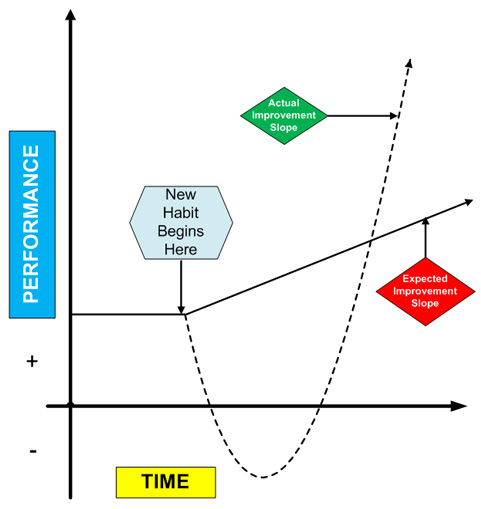
Well, it’s mid-May in Chicago and spring has sprung. To me that means golf. As a matter of fact, I was supposed to play with a client the other morning and was equally eager to see him and catch up as I was to play. But the weather didn’t cooperate since it was going to rain and feel like 35°. Ouch!
Golf is a sport that requires a lot of practice to create the muscle memory to consistently hit the ball well and it has taken me many years to learn to play well enough to enjoy the game and not embarrass myself. It’s now a passion and I have had the good fortune of playing many fine courses with lots of great people. So is this blog just about golf? No, but it actually made me think of two critical questions I have for any leader that I’d like you to consider:
- Do you solicit the right feedback to ensure that you continue to improve your leadership effectiveness and the results that you, your team and your organization demand?
- How often have you tried to incorporate new skills, tools or adjust habits at work only to fall back on older habits because the changes got to difficult?
In this post I want to help you understand why we often abandon well-intentioned changes and will use two parallel examples. The first will deal with golf, but I promise you that I’ll keep that short and sweet. The second will be all about how we delegate tasks in a more efficient and effective way. I will also share with you a model of how the difficulty of making changes impacts us and why persistence usually pays off.
Feedback to Determining What’s Wrong
The first step is always the hardest step in that in trying to figure out what the problem is and what the potential solutions might be to choose from.
One common golf challenge for right-handers like myself is what we call a slice. This is when the ball gets pushed to the right instead of going straight as we intend. Severe slices can take us out of bounds and even moderate ones can leave us in the taller grass making those shots more difficult. The causes for slicing the ball have to do with how we address the ball, how we grip the club and various other things. Hitting a golf ball looks easy to do, but minor problems add up to lots of extra strokes during a round.
One critical leadership challenge that my clients consistently face is how to delegate effectively. They often find they have too much work to do themselves and need to take something off their plate. I’m sure that issue is familiar to many. The need for delegating is often very clear but it also requires a certain amount of planning and preparation that make it difficult to do well, especially when you begin to embrace the concept.
So the need to adjust our approach to hitting a golf ball or reducing the feelings of being overwhelmed by all the work that confronts you are often very clear. Now the next challenge has to do with what are the potential range of solutions, selecting the appropriate ones and implementing them. Suffice it to say that a lesson from the local golf pro and hitting a lot of range balls can help you with your slice. The delegation issue is more complicated.
Choosing a New Way or Habit
Although we understand what it feels like to be overwhelmed by too much work, we often fail to understand what the causes are.
It becomes difficult to consider delegation when we consistently procrastinate about attacking issues and investing the time needed to plan for how we can tackle them. Some repetitive tasks and challenges don’t require much planning since we know what to do and we just have to do it. When there are newer or more difficult challenges we often have to look for different solutions.
Leaders resist delegating for several reasons:
- They fear that if they are not involved in all discussions, they will lose control;
- They believe they have to be infinitely available to participate in all meetings, calls and respond to all email;
- They don’t know how to utilize their staff well by delegating the right things to the right people;
- They’re not clear on how to set expectations about what feedback they need on the progress of various tasks along the way.
If the leader comes to grips with these issues and plans for effectively delegating to members of his or her team, then, just like the cure for the slice, the situation should begin to improve immediately, right? The answer to that is unfortunately, no. This chart, will show you why:

Adapted from The Coaching Revolution, David Logan, Ph.D. & John King, 2001, Adams Media Corp.
When we adjust a current behavior or begin to institute a new habit, we are full of the joys of spring about the potential results. Think New Year’s Resolutions and diets. It happens to us all. We expect that things will improve and the slope of the improvement will continue to climb right up. But reality intrudes! When we make behavioral changes – and that’s what they are, we run into resistance.
In golf when we have an important shot to hit and we begin thinking about all the changes in our swing that are needed to overcome our slice problem, we will often revert back to our old habits out of either comfort or forgetfulness. Bad outcomes can make us reconsider that and certainly encourage us to go back and practice it more. So in the short run we can find that our performance gets a little worse until the changes become the “new normal” and we commit to them without thinking about it. Then we see that the slope of the improvement part of the graph is much greater than it would have been.
I have seen the challenge of delegation with many clients over the years. The reasons for resisting that I listed are very real and very challenging. If a leader fails to inform one of their subordinates about certain information they will need to carry out the delegated task, you may end up with resistance or anger on the part of the subordinate.
The planning for the delegation often takes time up itself. That’s why you often hear it’s easier and quicker for someone to just do it themselves. But their time crunch never lessens and their staff don’t get the chance to grow and develop as they could. So the give-and-take that’s needed to shape a leader into being an effective delegator literally does create its own time crunch, enhancing the decline in the slope of the improvement line in the short run.
These challenges in implementing new habits or behaviors cause us to often abandon well laid plans and intentions. Again, think of diets. If you have the patience and determination to stick to your plan and adjust as needed, you will begin to see the evidence of the improvements that you are seeking. For the leader who seeks to delegate more, they do find they have more time for their own work AND not only does the work get done, but there are new opportunities for growth and development on the part of the staff that takes on the delegated duties.
I wish I could say that my efforts at building a better swing by implementing more effective habits in my golf game have made me into the golfer I desire to be. But I can’t. But as I like to say to my financial advisor as we discuss investment options, “Hope Is Not a Strategy”. You have to be very persistent in overcoming the discomfort that these changes are creating for you and recognize the incremental progress along the way.
It was Winston Churchill who said: Never, never, never give up.
I don’t mean to say that you shouldn’t abandon certain behavioral or process modifications that don’t seem to work, but I believe if you can better understand the very predictable challenges of implementing any change before you really see the return on the investment longer-term, you can hopefully find the persistence that you need to stay the course and implement your plan. To make any change or habit a reality, think of these few elements of success:
- Take time to plan – what do you want to do and how will that be different;
- Tell others what you are doing and why, enlist their support;
- Build in milestones for charting your progress;
- When you’ve successfully implemented the change or habit, step back and reflect on how you did it so you can learn from your success.
Good luck with your new habits. I look forward to your comments. And hit ’em straight!



Leave a Reply